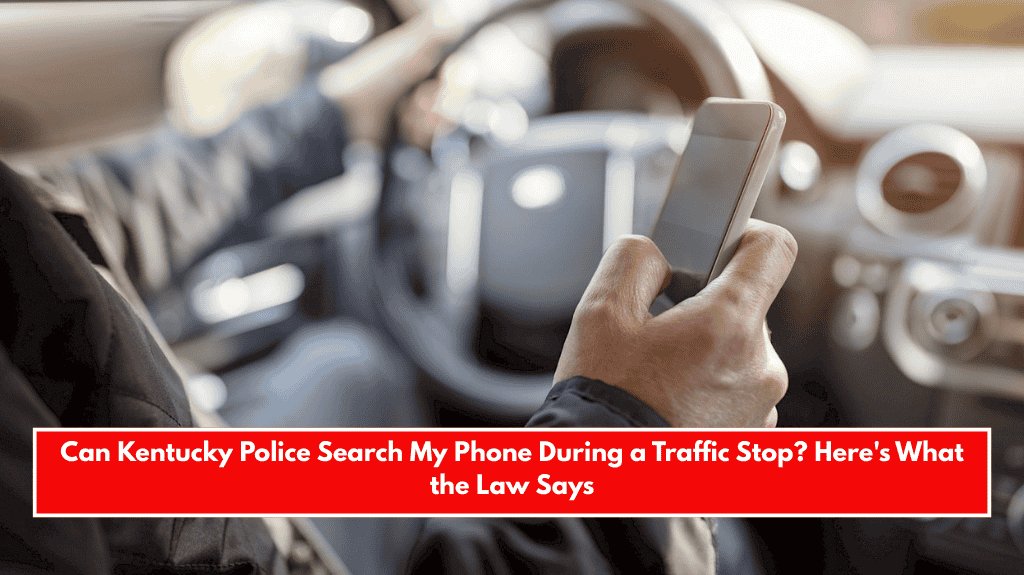Kentucky law, guided by the U.S. Constitution and Supreme Court precedent, places clear limits on when police can search your cell phone during a traffic stop. Here’s a detailed breakdown of your rights and what you should do if you find yourself in this situation.
Your Cell Phone Is Protected by the Fourth Amendment
- The Fourth Amendment protects you from unreasonable searches and seizures, and this protection extends to your cell phone.
- Police cannot search your phone simply because you’ve been pulled over or even if you’ve been arrested during a traffic stop.
When Can Police Search Your Phone?
There are only a few circumstances in which Kentucky police can legally search your phone during a traffic stop:
- With Your Consent: If you voluntarily allow police to search your phone, they do not need a warrant. Never feel pressured to consent; you have the right to say no.
- With a Search Warrant: Police must obtain a search warrant from a judge to access the contents of your phone. This requires them to demonstrate probable cause that evidence of a crime will be found on your device.
- Exigent Circumstances: In rare emergency situations—such as imminent danger to life, risk of evidence destruction, or escape of a suspect—police may search without a warrant. However, courts strictly limit this exception, and it is rarely justified for cell phone searches.
- Incident to Arrest (But NOT Your Phone): After an arrest, police can search your person and the area within your immediate control for weapons or evidence. However, the U.S. Supreme Court (Riley v. California) ruled that this does not extend to digital information on your phone—a warrant is still required for that2.
What Should You Do If Police Ask to Search Your Phone?
- Politely Refuse Consent: If an officer asks to search your phone, you have the right to refuse. Say calmly and clearly, “I do not consent to a search of my phone.” Do not hand over your password or unlock your device.
- Do Not Be Intimidated by Threats: Sometimes officers may say they’ll “get a warrant.” Unless they actually present a signed warrant, you are not required to comply. The process of obtaining a warrant takes time and must be approved by a judge.
- Stay Calm and Respectful: Always remain polite and non-confrontational. Do not attempt to physically prevent a search, as this could result in additional charges.
- Invoke Your Right to an Attorney: If you are arrested, state that you wish to speak to a lawyer before answering any questions or providing access to your phone.
What Happens If Police Search Your Phone Illegally?
- Evidence May Be Suppressed: If police search your phone without your consent, a warrant, or a valid exception, any evidence they obtain may be excluded from court. Your attorney can file a motion to suppress this evidence.
- Document the Incident: Take note of what happened, including what the officer said and did. Share this information with your lawyer as soon as possible.
Key Points to Remember During a Traffic Stop
- You do not have to answer questions beyond providing your name, license, registration, and proof of insurance.
- You can refuse consent to any search, including your phone and your vehicle.
- If police begin a search you did not consent to, calmly state your objection but do not interfere physically.
- If arrested, clearly state your wish to speak to an attorney before answering further questions.
Police Search of Your Phone in Kentucky
| Scenario | Can Police Search Your Phone? | What Should You Do? |
|---|---|---|
| Routine traffic stop | No, not without consent/warrant | Politely refuse consent |
| You give consent | Yes | Know your rights before consenting |
| Police have a warrant | Yes | Ask to see the warrant |
| After arrest (no warrant) | No, warrant still required | Refuse consent, ask for attorney |
| Exigent circumstances | Rarely, only in emergencies | Refuse consent, document the situation |
In Kentucky, police cannot search your phone during a traffic stop unless you give consent, they have a warrant, or a rare emergency justifies it. Politely refuse consent, ask for a lawyer if arrested, and document any unlawful search for your attorney.
Sources:
- https://www.hoffmanlawyer.com/your-rights-during-a-traffic-stop-in-kentucky/
- https://www.criminallawyerlouisvilleky.com/police-search-cell-phone/
- https://www.pharrlawgroup.com/blog/2024/01/remember-your-rights-during-a-kentucky-traffic-stop/
- https://www.kacdl.net/content.asp?contentid=187
- https://dpa.ky.gov/kentucky-department-of-public-advocacy/findhelp/rights/













